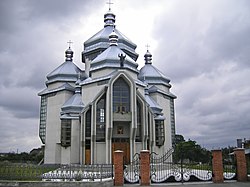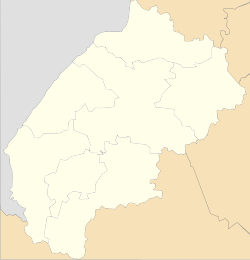Radekhiv
City in Lviv Oblast, Ukraine From Wikipedia, the free encyclopedia
Radekhiv (Ukrainian: Радехів, IPA: [rɐˈdɛxiu̯] ⓘ; Polish: Radziechów, Yiddish: ראדעכעוו) is a city in Sheptytskyi Raion, Lviv Oblast (region) of Ukraine. It hosts the administration of Radekhiv urban hromada, one of the hromadas of Ukraine.[1] Population: 9,680 (2022 estimate).[2]
Radekhiv
Радехів | |
|---|---|
 New Saint Nicholas Church | |
| Coordinates: 50°16′58″N 24°38′15″E | |
| Country | Ukraine |
| Oblast | Lviv Oblast |
| Raion | Sheptytskyi Raion |
| Hromada | Radekhiv urban hromada |
| First mentioned | 1472 |
| Magdeburg rights | 1752 |
| Area | |
• Total | 16.26 km2 (6.28 sq mi) |
| Elevation | 231 m (758 ft) |
| Population (2022) | |
• Total | 9,680 |
| • Density | 600/km2 (1,500/sq mi) |
| Time zone | UTC+2 (EET) |
| • Summer (DST) | UTC+3 (EEST) |
| Postal code | 80200 |
| Area code | +380-3255 |
| Website | http://radekhiv-miskrada.in.ua/ |
Ed Stelmach, the premier of the Canadian province of Alberta from 2006 to 2011, is descended from immigrants who arrived in Canada from Radekhiv.[3] The town is the birthplace of Polish lawyer and government minister Kazimierz Wladyslaw Kumaniecki, Polish diplomat Marian Szumlakowski, and Polish art historian Juliusz Ross.
Until 18 July 2020, Radekhiv was the administrative center of Radekhiv Raion. The raion was abolished in July 2020, as part of the administrative reform of Ukraine, which reduced the number of raions of Lviv Oblast to seven. The area of Radekhiv Raion was merged into Chervonohrad Raion (modern Sheptytskyi Raion).[4][5]
History
Summarize
Perspective
The first written mention of Radekhiv dates back to 1472. The territory on which the city was founded was part of the Belz principality, which was formed around 1170 and belonged first to the Volodymyr-Volyn and then to the Galicia-Volyn principalities. In 1578, the Tatars completely destroyed Radekhiv, Vytkiv, Polove, and Seredpiltsi, as can be seen in the tax books of the time.
At the beginning of the eighteenth century Radekhiv came under the ownership of Count Mir. In Radekhiv, the count built a large palace that became the center of the magnate's latifundia. Trade gradually began to revive in the town, which turned it into a city.
In the second half of the nineteenth century, the Radekhiv latifundia passed to the family of Count Badeni, who married his daughter Mira. Badeni was considered the seventh of the ten richest magnates in Galicia and was the Austrian emperor's governor in Galicia. He rebuilt and expanded the palace, planted a park, built a greenhouse, and ordered a three-meter high stone wall to enclose his property. Count Badeni, the father, did much to enrich himself. At that time there were small industrial and commercial firms in Radekhiv. In 1910, the construction of the Lviv-Stoyaniv railroad was completed in Radekhiv, financed by Badeni.
According to statistics, in 1880 Radekhiv was home to 3555 people. It is known that 129 people served at the public court.
In the late nineteenth and early twentieth centuries, a number of public organizations existed in Radekhiv, including the "Farmer" society. For 16 years, there was a "Money Society of Friends of School Children," which aimed to provide financial assistance to poor children, regardless of their nationality or religion. There was also the Brotherhood of Sobriety.
Since the second half of the nineteenth century, the Prosvita society has been operating, which aimed to protect the interests of the Ukrainian language and culture and to raise the level of education of the local Ukrainian population. A reading room was opened in Radekhiv in May 1897.
In November 1912, the People's House was solemnly consecrated. Nowadays, this building houses the Radekhiv Central Library at the city council. The People's House housed an industrial school, a folk school, the Native School, Enlightenment, and Agricultural Society. At the end of 2018, Radekhiv became the administrative center of the united territorial community.
The town had a Jewish population of about 2000, about half its residents, before World War II. Some were murdered immediately when the town was occupied in June 1941. In September 1942, 1400 Jews were sent to Belzec, and more Jews were concentrated in the town's ghetto from elsewhere, and themselves were later sent to Belzec. [6]
Gallery
- City hall
- Old brewery
- Old Saint Nicholas Church
References
Wikiwand - on
Seamless Wikipedia browsing. On steroids.







